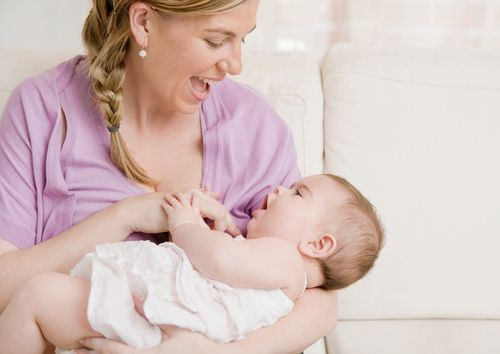Does Baby 'Babbling' Lead To Faster Language Development? Surprising New Research Challenges Traditional Advice

Parents may experience the impulse to start talking in a high-pitched tone and stretch out their vowels saying, “Who’s my li-i-ttle baybee?” and “goo goo gah gah” when encountered with a baby as a form of communication. New parents have often heard the common advice of the more words their babies hear, the faster their vocabulary will grow. Now, according to a recent study, parents who engage in one-on-one baby talk with their infant are actually helping them to improve their vocabulary and their overall language development.
The concern of whether to speak to a baby in a childish voice or whether to talk to them in a regular tone is faced by many parents. The common belief that baby talk will impair a child’s early language development when they are older has been disproven by the medical community. According to Psychology Today, baby talk is the best way for a child to learn their parents’ language, especially if it is done in a one-on-one setting. This form of speech is sometimes referred to as “motherese” or “parentese” — predictable with a pronounced rhythm that catches the baby’s attention. Typically, baby talk is accompanied by adult eye contact and gaze movement that is exaggerated by facial expressions, rhythmic movement, and gesture. Upon talking to babies, adults make sure they say the right words and repeat and emphasize them so the child can easily grasp the short sentences and simple concepts.
Researchers at the University of Washington and the University of Connecticut have weighed in on the potential benefits baby talk has on the early language development of a child. The study, which will be published in an upcoming issue of the journal Developmental Science, examined thousands of 30-second snippets of verbal exchanges between parents and babies to determine whether baby talk is linked to better language development than regular speaking voice. Twenty-six babies — about one year old — wore vests that contained audio recorders that collected sounds from the children’s auditory environment for eight hours a day for four days.
LENA (language environment analysis) software was utilized by the researchers to examine the recordings of speech. The researchers were able to identify who was talking in each segment, how many people were there, whether baby talk or regular voice was used, along with other variables, according to the news release.
The parents were asked to fill out a questionnaire as a means for the researchers to measure how many words their children knew by the age of two. The findings revealed infants who heard more baby talk knew more words. Two-year-olds in families who spoke the most baby talk in a one-on-one social context knew 433 words, on average, compared with the 169 words recognized by 2-year-olds in families who engaged in the least baby talk in one-on-one situations.
Parents who exaggerated vowels like "How are youuuuu?" and raised the pitch of their voices led to more babbling from the 1-year-olds. This proved especially effective when a parent spoke to the child individually rather than with other adults and children around. This relationship was persistent even after the study authors accounted for the socioeconomic status of the 26 families.
This highlights the concept that the quantity of words doesn’t spur early language development compared to the style of speech and social context in which the speech occurs. "What our analysis shows is that the prevalence of baby talk in one-on-one conversations with children is linked to better language development, both concurrent and future," said Patricia Kuhl, co-author and co-director of UW's Institute for Learning & Brain Sciences, Medical Xpress reported.
“What this study is adding is that how you talk to children matters,” said Nairan Ramirez-Esparza, first study author and an assistant psychology professor at the University of Connecticut. “Parentese is much better at developing language than regular speech, and even better if it occurs in a one-on-one interaction.”
Language development in 1- and 2-year-olds begins to take off as kids are better able to comprehend what is said to them and express what they want through words and gestures, says KidsHealth. While a child’s vocabulary will begin to rapidly grow, pronunciation may take longer. Parents are advised to emphasize the correct pronunciations in their responses to their children’s dialogue.
To learn more about early language development, visit http://kidshealth.org/.
Source: McElroy M. Babbling babies — responding to one-on-one ‘baby talk’ — master more words. University of Washington news release. 2014.



























